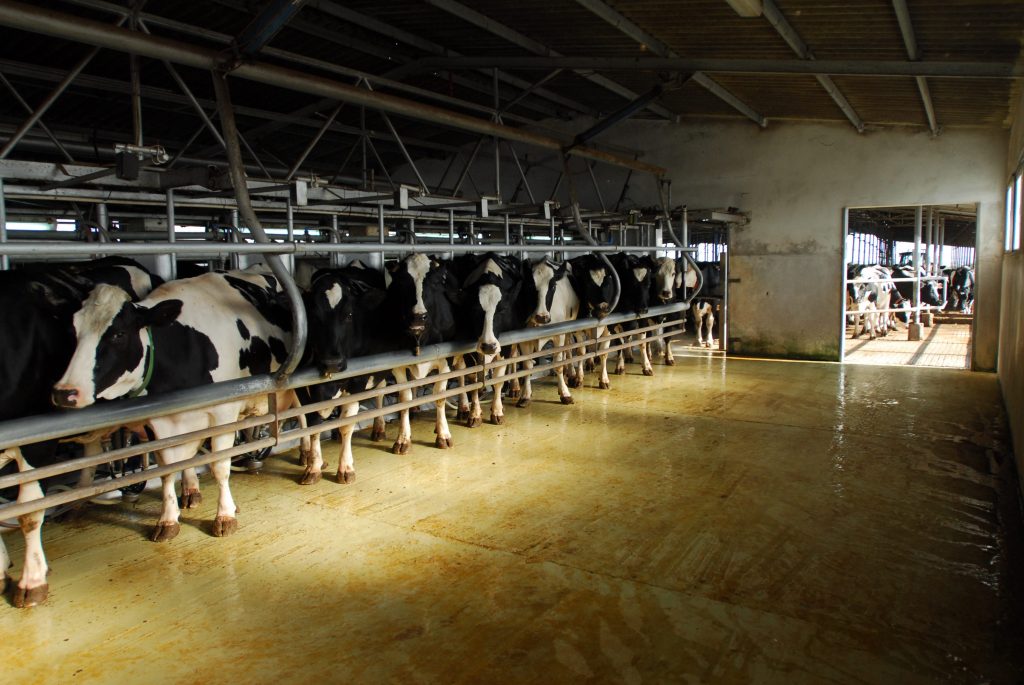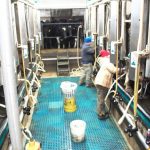
At Mapleine, she’s cut the milking herd of Jerseys from 120 — the number that would be milking on a normal summer — to 100 and she’s changed her cow’s diet in order to cut their production even further mirroring steps taken by farmers across the region.
“But when consumers go to the grocery store, they might see signs saying, ‘pleas only buy one gallon of milk,” Dizek said. “It has to do with distribution. It’s whiplash. You don’t know what’s happening from week to week.”
Mapleline has had to “dump some loads” — throw away milk that couldn’t find its way into the production stream and to a customer.
“You are still milking twice a day,” Dizek said. “You just aren’t getting paid for it.”
But things are getting better as the shocks of spring give way to June, National Diary month.
The 106-year-old Mapleline Farm has the old-fashioned advantage of processing and bottling milk from its herd right there on the farm then distributing that milk to retailers — Big Y Foods Inc. sells it locally — and through innovative delivery services that have sprung up in the wake of coronavirus like Sunderland Food Collaborative, a delivery service offering local food including milk from Mapleline, Cream of the Crop in Russell and High Lawn Farm in Lee.
Mapleline gave up its delivery service. But with coronavirus keeping folks at home and making many wary of going out to the grocery store Sunderland Food Cooperative formed in March to deliver farm-fresh food.
“When supplies in retail get short, people flock to home delivery,” said Michael DeAngelis, vice president of integrated communications and a registered dietitian for New England Dairy, a trade group. “I know farmers who can’t keep up with demand.”
The pandemic caught dairy farmers — who’ve been faced with oversupply and dropping demand for years — in a tough spot. Institutional buyers like schools and colleges closed down.
So did restaurants. While consumer demand picked up it hasn’t made up for the loss of commercial and school customers and the sizes and types of products are different.
DeAngelis said the change in the market could be as subtle as a person working from home buying a pint of half-and-half for the morning coffee at eh expense of a coffee shop that would normally order gallons of the stuff, but has no business because customers aren’t commuting.
That left processors like Agri-Mark, which makes Cabot and McAdam brands and has a plant in West Springfield selling 1-bound bricks of butter in stores instead of four quarter-pound sticks, said Douglas DiMento, director of corporate communications, at Agri-Mark.
Agri-Mark recently donated 5-pound tubs of sour cream to food banks. An odd thing for families looking for shelf-stable staple foods to receive. But it’s what was on hand and the restaurant market dried up. The sour cream had to go somewhere or it would go to waste.
“Everyone is nervous,” DiMento said.
Agri-Mark has aksed its farmers to cut their production and its plant in West Springfield makes shelf-stable products like butter and dry lowfat milk powder. that allows it to find markets for milk that are not time-sensitive.
Only a handful of Agri-Mark member farms have stopped milking altogether and sold their herds since coronavirus hit. DiMento said he’s a little pleasantly surprised by that but expects the number to grow as the summer wears on.
“This is a big time of year for farmers,” he said, “You have to spend money on fertilizer so that you have feed in the fall. You have all these inputs and no guarantee of making money. A lot of people are going to made decisions.
He said with some restaurants re-opening there is some pickup in ordering through food-service customers., And grocery-store orders are high for cheese and butter, shelf-stable products
“Everyone wants to restock their stores right now,” DiMento said “Once they get restocked, what happens. What will the normal be like?”
He said the emphasis on local and fresh is certainly here to stay. Every Agri-Mark member with a sideline selling vegetables at a roadside stand reports land-office business, he said.
Mapleline distributor Worcester Regional Food Hub pivoted when coronavirus hit from a wholesale distributor linking Massachusetts farms, fishing operations and small manufactures with restaurants and retailers to a retailer itself selling food — including Mapelline Milk — in to-go food boxes to consumers, director Shon Rainford said.
That means 200 half gallons a week including 120 half-gallon bottles sold in food boxes customers picked up in the parking lot of a Worcester church Wednesday afternoon.
“Pre-pandemic, we weren’t selling very much milk at all,” Rainford said.
He said he still sells Mapleline Milk to a few retailers, including Strong Style Coffee in Fitchburg, and expects that business to pick up as more restaurants and cafes open.
He also expects Worcester Regional Food Hub to stay in the direct-to-consumer food box business as consumers continue eating at home, avoid chopping and wanting to eat fresh and local.
“we just wanted to continue supporting the farmers in our area,” he said. ‘It’s really taken off.”
The food boxes also have products like cheeses and kettle corn that are from local producers that aren’t necessarily farms
“Those companies re in trouble as well,’ Rainford said. “I have food producers who are sleeping in their offices right now because they can’t afford rent for a place to live.”























